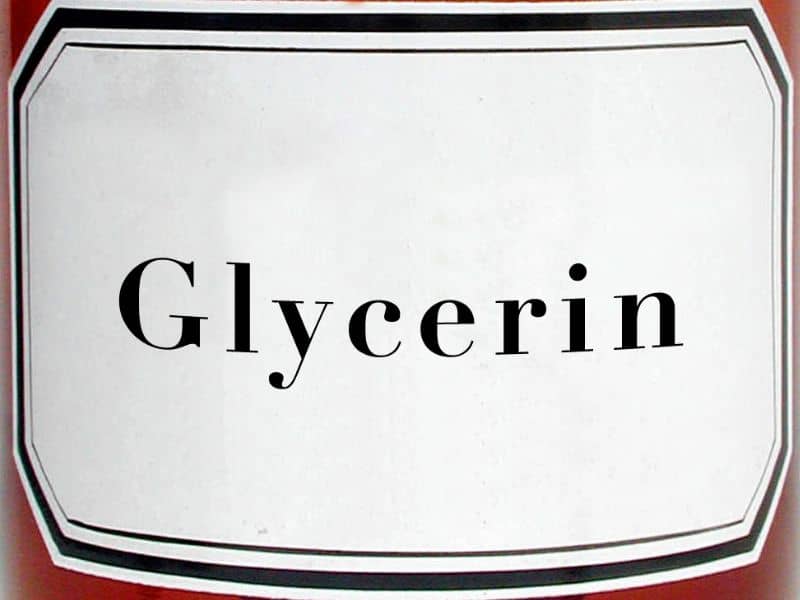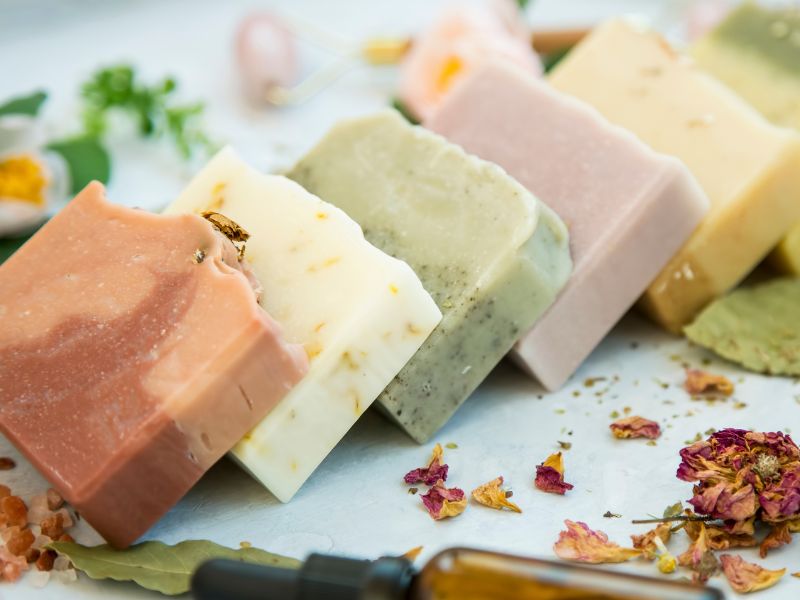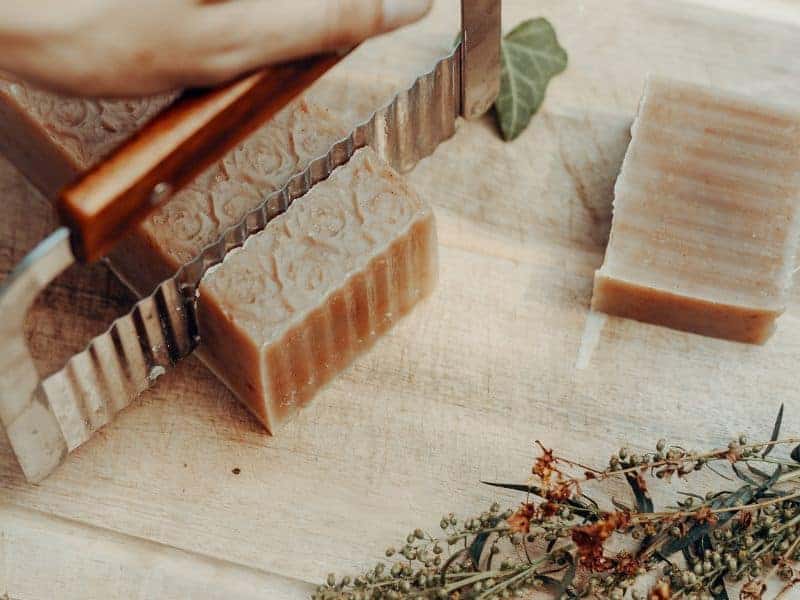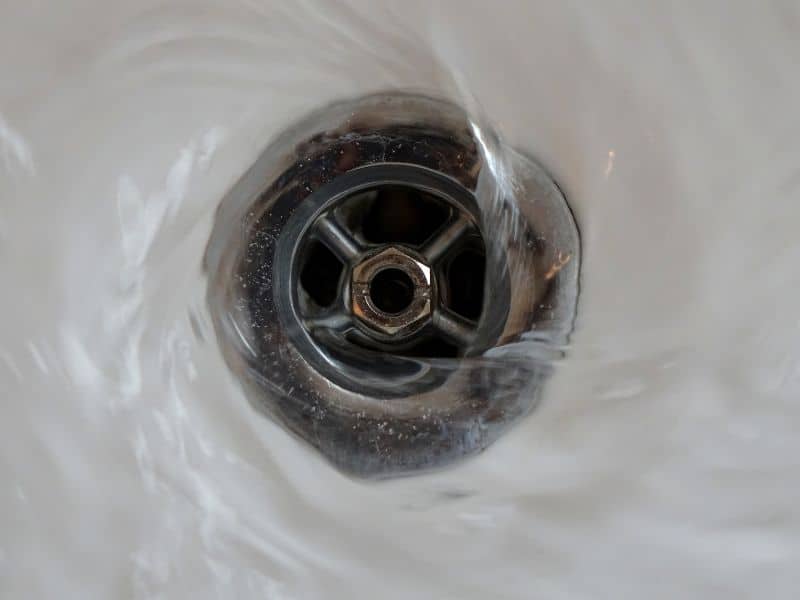Glycerin, also known as glycerol, is a versatile ingredient commonly used in soap-making and cosmetics due to its unique properties. Glycerin is a colorless, odorless, and viscous liquid that is derived from natural sources such as vegetable oil or animal fat. Its molecular structure contains three hydroxyl groups that make it a powerful humectant, meaning it has the ability to attract and retain moisture from the surrounding environment.
Glycerin is a safe and natural preservative that is present in a variety of soaps and cosmetics. It is derived from natural sources such as vegetable fats and animal fats. Glycerin is a humectant that is also known for its moisturizing properties.
In soap making, glycerin, or glycerol as it is also known plays a vital role as a byproduct of the saponification process. During the process of making soap, the fats and oils are reacted with lye, and the resulting mixture is saponified to create soap. Glycerin is produced as a natural byproduct of this process, and it is often removed to make glycerin soap or other products.
The Many Uses of Glycerin
Glycerin is used in a wide range of products, from soaps and cosmetics to food and beverages.
Glycerin has a wide variety of uses in many organic products as a humectant, a solvent, 28 an emollient, a sweetener, a bodying agent, a preservative, a filler in low-fat foods, an alcohol-free solvent for 29 botanical extracts, cosmetics, and pharmaceutical agents, a thickening agent in liqueurs, a hydrating agent 30 used in sports and energy drinks and in the manufacture of cellophane, cosmetics, and meat casings.
USDA.GOV
In terms of its use as a preservative, glycerin helps to extend the shelf-life of products by reducing oxidation and preventing mold, bacteria, and yeast growth. Let’s get back on point and look at the purposes of glycerol, or glycerin as it is also known in soap making.
Purposes of Glycerin in Soap Making
The purpose of glycerin in soap making and cosmetics can be summarized as follows:
Moisturizing
Glycerin’s humectant properties make it an excellent moisturizer. It attracts water molecules and holds them close to the skin, helping to hydrate and soften it. This makes glycerin an essential ingredient in lotions, creams, and other moisturizing products.
Emollient
Glycerin’s thick and sticky consistency makes it an effective emollient, which means it helps to smooth and soften the skin. It is often used in lip balms and other skincare products that require a thick, spreadable texture.
Cleansing
Glycerin can also be used as a cleansing agent due to its ability to dissolve oil and dirt. It is often added to facial cleansers and body washes to help remove impurities and leave the skin feeling clean and refreshed.
Preservative
Glycerin has some preservative properties that can help to extend the shelf life of products. It can inhibit the growth of bacteria and other microorganisms that can cause spoilage or degradation.
Humidity control
Glycerin can be used to control the humidity level in cosmetic products. It can absorb excess moisture in humid environments, preventing the growth of mold and bacteria.
Glycerin as a Preservative
In addition to its moisturizing and emollient properties, glycerin is also known for its preservative qualities.
Antimicrobial and Antifungal Benefits
Glycerin has been shown to have antimicrobial and antifungal properties, which makes it an effective preservative in some cases. When added to products like soap and cosmetics, glycerin can help to extend their shelf life by inhibiting the growth of bacteria and other harmful microorganisms.
Some Limitations As a Preservative
While glycerin can be an effective preservative in some cases, it does have its limitations. For example, glycerin may not be effective against all types of bacteria and fungi, and it may not be effective at preventing the growth of mold.
Overall Effectiveness As a Preservative
Glycerin has some preservative properties, but it is not as effective as other natural or synthetic preservatives. Glycerin can inhibit the growth of some types of bacteria and fungi in high concentrations, but it may not be sufficient to prevent spoilage or contamination of a product on its own.
The effectiveness of glycerin as a preservative depends on the concentration used, the pH of the product, and the specific microorganisms that may be present. A concentration of at least 50% glycerin is generally required to achieve any preservative effect, and even then, it may only be effective against certain types of microorganisms.
Therefore, glycerin is often used in combination with other preservatives to provide a broader spectrum of protection against microbial growth. It can also be used to enhance the effectiveness of other preservatives or to help stabilize other active ingredients in a product.
Glycerin vs Natural Preservatives
There are many other natural preservatives that are commonly used in the manufacturing of soap and cosmetics.
Some of the most popular natural preservatives include:
- Vitamin E
- Grapefruit seed extract
- Tea tree oil
- Rosemary extract
When compared to these natural preservatives, glycerin is generally considered to be less effective at inhibiting the growth of bacteria and fungi.
However, glycerin does have other benefits, such as its moisturizing and emollient properties, which make it a popular ingredient in many skincare products.
Alternatives to Glycerin
There are several other natural preservatives that can be used in soap-making to ensure the safety and longevity of the product.
Here are some alternatives to glycerin as a preservative in soap:
- Vitamin E Oil: This oil is a natural antioxidant that can extend the shelf life of soap by slowing down the oxidation process. It also has moisturizing properties that can benefit the skin.
- Rosemary Extract: Rosemary extract is a natural antimicrobial that can help to prevent the growth of bacteria, mold, and other microbes in soap. It is also a natural antioxidant that can help to prolong the shelf life of soap.
- Grapefruit Seed Extract: Grapefruit seed extract is a powerful antimicrobial and antioxidant that can help to preserve soap and prevent the growth of bacteria and other microbes.
- Essential Oils: Many essential oils, such as tea tree oil, lavender oil, and eucalyptus oil, have natural antimicrobial properties that can help to preserve soap and prevent the growth of bacteria and other microbes.
- Salt: Salt is a natural preservative that can help to prevent the growth of bacteria and other microbes in soap. It can be added to the soap mixture or sprinkled on top of the soap after it has been poured into molds.
It is important to note that while these alternatives can help to preserve soap and prevent the growth of bacteria and other microbes, they may not be as effective as synthetic preservatives.
Frequently Asked Questions
Glycerin is generally safe for all skin types, including sensitive skin. It is non-toxic, non-irritating, and non-allergenic.
Glycerin can affect the lather of soap, making it less bubbly and creamy. However, it also helps to make the lather more stable and longer-lasting.
Yes, glycerin is a common ingredient in many other skincare products, including lotions, creams, and serums.
Yes, glycerin is biodegradable and is not harmful to the environment. It is also a natural ingredient, which makes it a more sustainable choice for skincare products.
Glycerin is a natural moisturizer that is added to soap to help keep skin hydrated and soft. It also acts as a humectant, which means it helps to attract moisture to the skin.
Glycerin is a natural byproduct of the saponification process, which is the chemical reaction that occurs when oils or fats are mixed with an alkali, such as lye, to create soap.
Conclusion
In conclusion, glycerin is a popular ingredient in many skincare products because of its moisturizing and emollient properties. It is generally considered to be less effective than other natural preservatives at inhibiting the growth of bacteria and fungi, but can still be used to extend the shelf life of soap.
There are many alternatives to glycerin that can also be used in soap-making, such as vitamin E oil, rosemary extract, grapefruit seed extract, essential oils, and salt. Ultimately, it is important to consider which ingredient or combination of ingredients will work best for your particular product.






